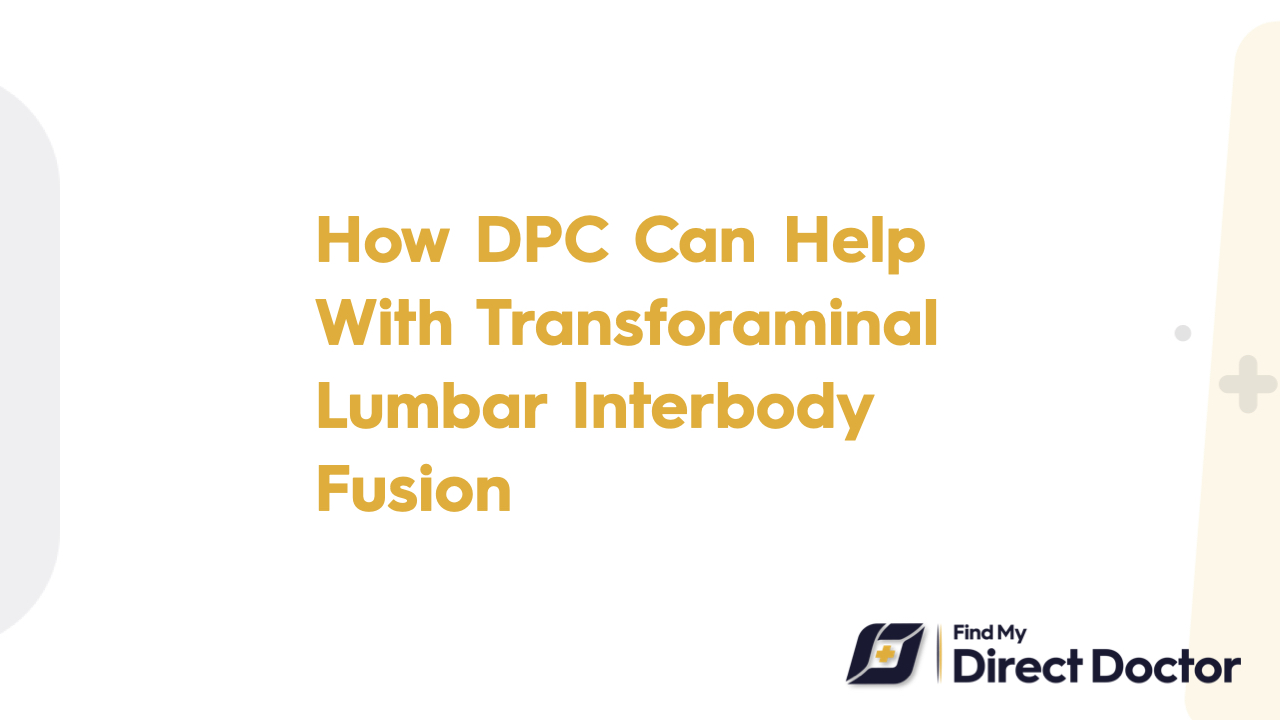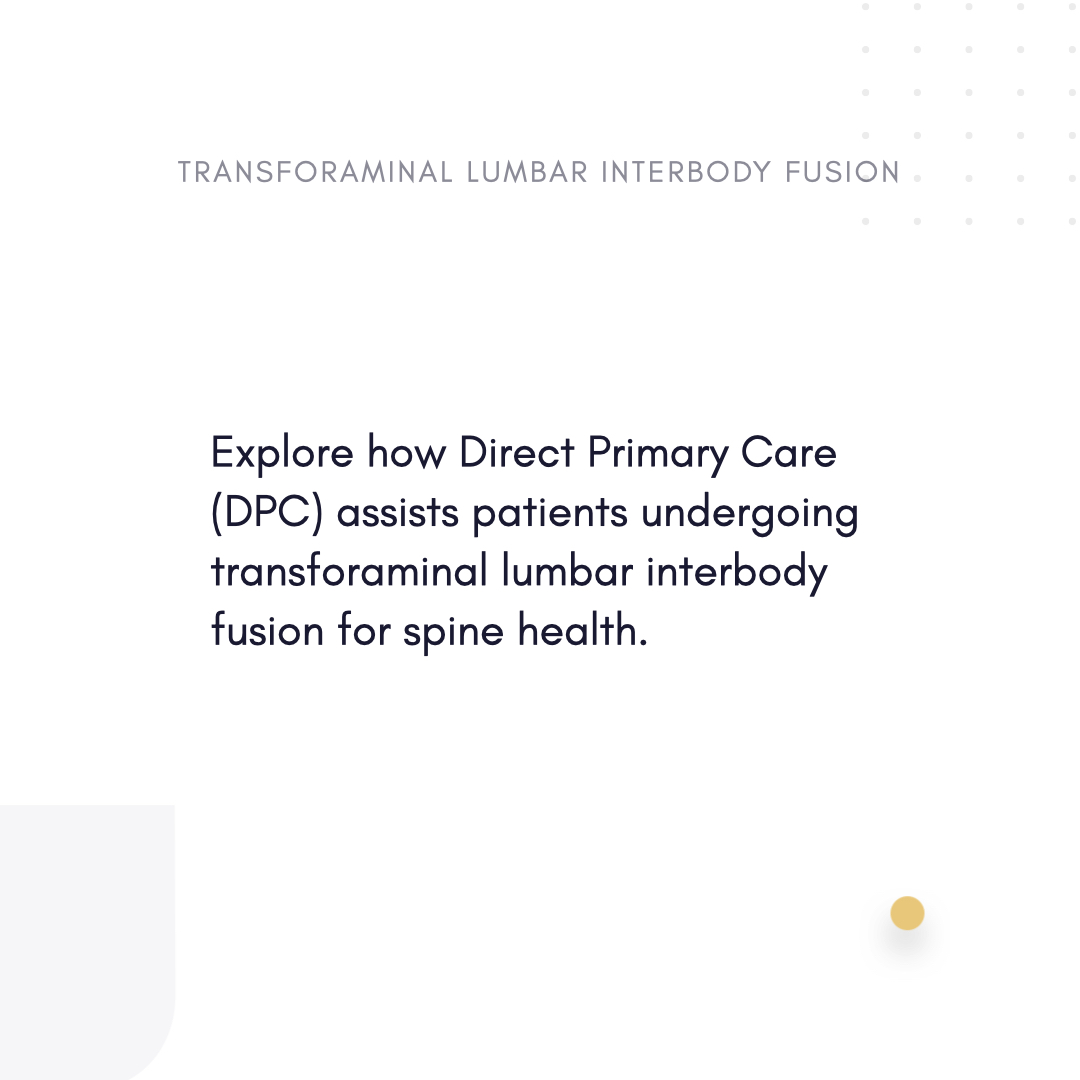Transforaminal Lumbar Interbody Fusion (TLIF) and Direct Primary Care (DPC): Stability, Support, Renewed Mobility
If your life is limited by chronic back pain caused by spinal instability, TLIF surgery can realign your spine. DPC makes sure that your surgery and recovery are planned, affordable, and fit your needs.

What TLIF is: Fusing Spinal Stability
A posterior approach is used in TLIF to remove damaged discs and fuse vertebrae. Important information:
- What it's used for: spondylolisthesis, degenerative disc disease, and spinal stenosis.
- Safety: 85–90% of fusions work, and the risk of nerve injury is less than 2%.
- Minimally invasive surgery (MIS-TLIF) causes less damage to tissue.
Important information:
- Costs: DPC memberships (200–500 USD/month) include pre-op consults and follow-ups, while traditional fees (50,000–100,000 USD/surgery) do not.
- Risks of waiting: nerve damage, chronic pain, and disability.
How DPC Improves TLIF Results
Direct Primary Care (DPC) changes how spinal care is done by putting the patient first and coordinating care ahead of time.
All-inclusive Before Surgery Prep
- Quick tests: Set up MRI/CT myelograms within 72 hours.
- Prehab programs: Make the core and paraspinal muscles stronger.
- Managing medications: Lower the dose of opioids or change the dose of anticoagulants.
Clear prices and all-around help
- Care that includes everything: Membership includes coordinating with the surgeon, physical therapy, and post-operative bracing.
- Saving money: You can save 30–50% on facility fees by using self-pay DPC rates.
- Focus on mental health: Help people with anxiety by sending them to therapy or teaching them how to be mindful.
Personalized Recovery and Long-Term Health
- Access 24 hours a day, 7 days a week: Take care of sudden pain or weakness in the legs right away.
- Virtual PT: Guide early mobility exercises via telehealth.
- Focus on prevention: Teach how to lift things correctly to protect fusion.
The Benefits of DPC for TLIF Patients
- No waiting times: 90% of DPC patients have surgery scheduled within two weeks, while it usually takes eight or more weeks.
- Continuity: One team is in charge of pain management, wound care, and following the rehab plan.
- No extra costs: Prices that are clear (for example, 35,000 USD for MIS-TLIF).
Success Stories from Real Life
- Case 1: Emma, 45, has grade II spondylolisthesis. Emma's DPC team did a MIS-TLIF, and she was back to work as a nurse in 12 weeks.
- Case 2: James, 58, has spinal stenosis. James's DPC provider used TLIF and decompression to get rid of his leg pain in six weeks.
Questions and Answers: TLIF in DPC
- Q: How long does it take to get better in the hospital?
- A: 2–3 days; don't bend or lift anything for 6 weeks.
- Q: Do I need a brace?
- A: Yes, a lumbar brace for 6–12 weeks; DPC will help you get fitted.
- Q: Is it possible for the fusion to fail?
- A: 5–10% chance; DPC checks with X-rays every year.
- Q: What if the pain doesn't go away?
- A: DPC looks into nerve blocks, revisions, or spinal cord stimulation.
Why DPC is the Best Choice for Spinal Care
The North American Spine Society (NASS) stresses care from many different fields. DPC gets things done by:
- Lessening problems: Prehab lowers the number of people who need to have surgery again by 25%.
- Increasing adherence: 90% of DPC patients finish PT, while only 60% of patients do so nationally.
- Saving money: Members save between 15,000 USD and 40,000 USD by getting all of their services at once.
TLIF in DPC isn't just about fusing your spine; it's about working with a team that cares about the health of your back. With DPC, you can skip referral delays, see the best spine surgeons, and get a recovery plan that works for you. From getting ready for surgery to standing up straight, you'll get care that's as strong as your spine.






